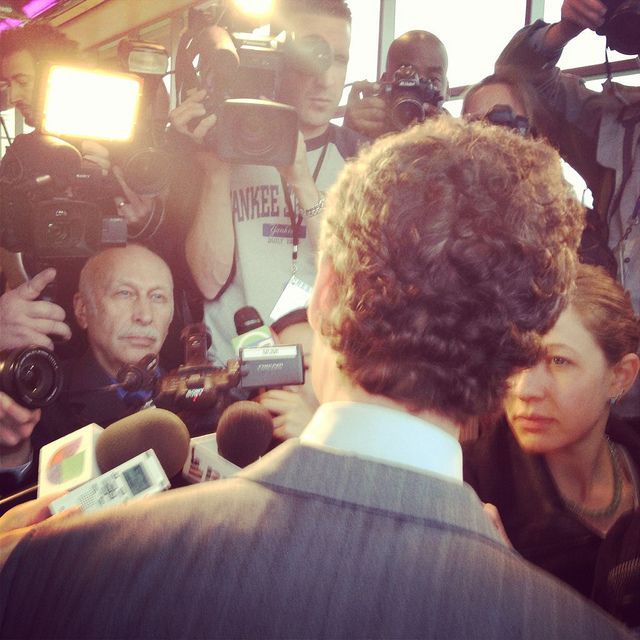
The road to Gracie Mansion is paved with failed contenders. Whose losses are mourned the most? (Flickr / Azi Paybarah)
This is the second post in a new regular column called “Speaking of…,” in which New Yorkers weigh in on the most pressing hypothetical questions of our time.
“They all do the same dumb shit. That’s all. And I got nothing other to say about it.”
In the Mott Haven section of the South Bronx, eighty-year-old Fats doesn’t bite when asked which past unsuccessful mayoral candidate he wishes had made it into Gracie Mansion.
“I ain’t seen nobody I really care about.”
And Fats has seen more contenders come and go than the average New Yorker—most of whom never found their way past the primaries.
That makes for a long list of also-rans still within living memory, all at one point having brought their own ambitions (frequently unrealistic), war chests (often too small), and promises (untested, unfulfilled) to the endeavor. I was curious which of them New Yorkers most regret missing out on.
How different would the city be today had Mario Cuomo won his bitter 1977 bid or had David Dinkins been reelected? Would we recognize the New York of 2015 if Rudy Giuliani’s opponent Ruth Messinger had managed to topple him back in 1997?
Eighteen years later, Erik Bottcher, chief of staff to City Council Member Corey Johnson, can’t help but ruminate on Messinger’s defeat. “Giuliani sold off hundreds of city-owned historic buildings to real estate speculators for cents on the dollar, many of which were being used as community centers,” Bottcher says, musing ruefully on this other New York that was lost when Messinger lost.
“Who knows? Maybe they’d still be standing today.”
It turns out Bottcher isn’t the only one with Messinger on the mind.
Internet radio personality and DJ Delphine Blue, whose show “The Rest Is Noise” is broadcast on Little Water Radio each week from offices in the South Street Seaport, is sometimes reminded of Messinger’s unrealized policy plans when she looks around the rapidly changing East Village where she lives.
“She proposed extending rent control to businesses as well as individuals,” Blue recalls. “Maybe we’d still have many of the mom-and-pop stores that are vanishing before our eyes.”
Up in Harlem, self-described everywoman and entrepreneur Denise Garrett is simultaneously handing out promotional material for a Memorial Day historical reenactment at Grant’s Tomb and, not by chance, distributing business cards for a restaurant/dance club located just a few blocks north of the monument.
She has commandeered a strategic square of sidewalk beside the storied Abyssinian Baptist Church, where she can intercept the European tourists who are turned away from the at-capacity 11:00am service.
“Tony Avella is a true public servant. He’s not a politician,” Garrett avers. “Tony Avella should have won that mayoral election.”
But Avella, at the time a member of the City Council representing parts of Queens, didn’t even get that far, losing the 2009 Democratic primary to Bill Thompson—himself ultimately (and very expensively) defeated by what became a third-term Bloomberg.
Garrett has her grievances ready and practiced. “Unfortunately today, when you contribute to a politician’s bank, you’re really actually bribing that politician. You can give him the vote that gets him in, but he’s going to pay much more attention when you give him that check.”
Buttressed by the force of her will and the stone façade of the church that looms behind her, Garrett is hard to argue with.
But it’s just as hard not to wonder if it isn’t a little quixotic to keep holding out for a hero every four years. How likely is any candidate to change a system that requires him or her to play by its own rules in order to win—especially in a city as big as New York?
There will always be plenty of idiosyncratic rule-breakers, thumbing their noses at the political machine and stamping “The rent is too damn high!” into voters’ collective consciousness. But they’ll never get close to City Hall that way. They know it. Probably you do, too.
For some voters, that knowledge seems only to increase their willingness to fight. But over time, it can leave others with what it left Fats—a wide, crowded memory, and nothing other to say about it.
.
 David Speer is a writer and performer based in New York City.
David Speer is a writer and performer based in New York City.
